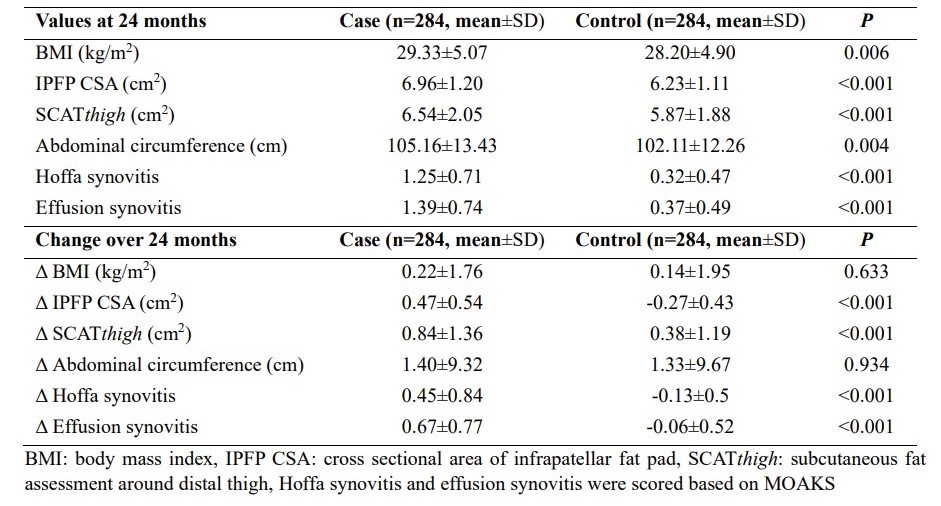Session Information
Session Type: Poster Session C
Session Time: 9:00AM-11:00AM
Background/Purpose: Adipose tissue is associated with knee osteoarthritis (KOA) progression. This study aimed to determine the association of infrapatellar fat pad (IPFP) size and subcutaneous adipose tissue around the distal thigh (SCATthigh) on KOA progression.
Methods: This case-control study used data from the Osteoarthritis Initiative (OAI) that included 315 cases (defined as right knees with an increase of ≥1 Kellgren-Lawrence score (KL) from baseline to 48 months) and controls that were matched by age, sex, race, and baseline KL. Cross sectional area (CSA) of IPFP and SCATthigh were measured using MRI images at baseline and 24 months. Multivariable conditional logistic regression models were used to estimate associations between IPFP and SCATthigh with KOA progression. Mediation analysis was used to assess whether IPFP CSA or SCATthigh mediates the relationships between KOA progression and obesity measures (body mass index [BMI] or abdominal circumference).
Results: IPFP CSA and SCATthigh measurements were significantly increased in cases compared to controls at 24 months, but not at baseline, and were not associated with a significant increase in obesity measures. Adjusted ORs (95% CI) for KOA radiographic progression 9.299 (5.357 – 16.141) for ΔIPFP CSA, 1.646 (1.288-2.103) for ΔSCATthigh, 1.286 (1.073-1.542) for baseline BMI, and 1.297 (1.091-1.541) for baseline abdominal circumference.ΔIPFP CSA significantly mediated the association between ΔSCATthigh and KOA progression (39.5%), but not between obesity markers and KOA progression.
Conclusion: KOA radiographic progression was associated with IPFP size and SCATthigh changes at 24 months, unrelated to an increase of BMI or abdominal circumference, suggesting that other factors trigger the worsening of local adipose tissue.
To cite this abstract in AMA style:
Lee K, Banuls-Mirete M, Lombardi A, Posis A, Chang E, Lane N, Guma M. Infrapatellar Fat Pad Size and Subcutaneous Fat in Knee Osteoarthritis Radiographic Progression: Data from the Osteoarthritis Initiative [abstract]. Arthritis Rheumatol. 2023; 75 (suppl 9). https://acrabstracts.org/abstract/infrapatellar-fat-pad-size-and-subcutaneous-fat-in-knee-osteoarthritis-radiographic-progression-data-from-the-osteoarthritis-initiative/. Accessed .« Back to ACR Convergence 2023
ACR Meeting Abstracts - https://acrabstracts.org/abstract/infrapatellar-fat-pad-size-and-subcutaneous-fat-in-knee-osteoarthritis-radiographic-progression-data-from-the-osteoarthritis-initiative/


